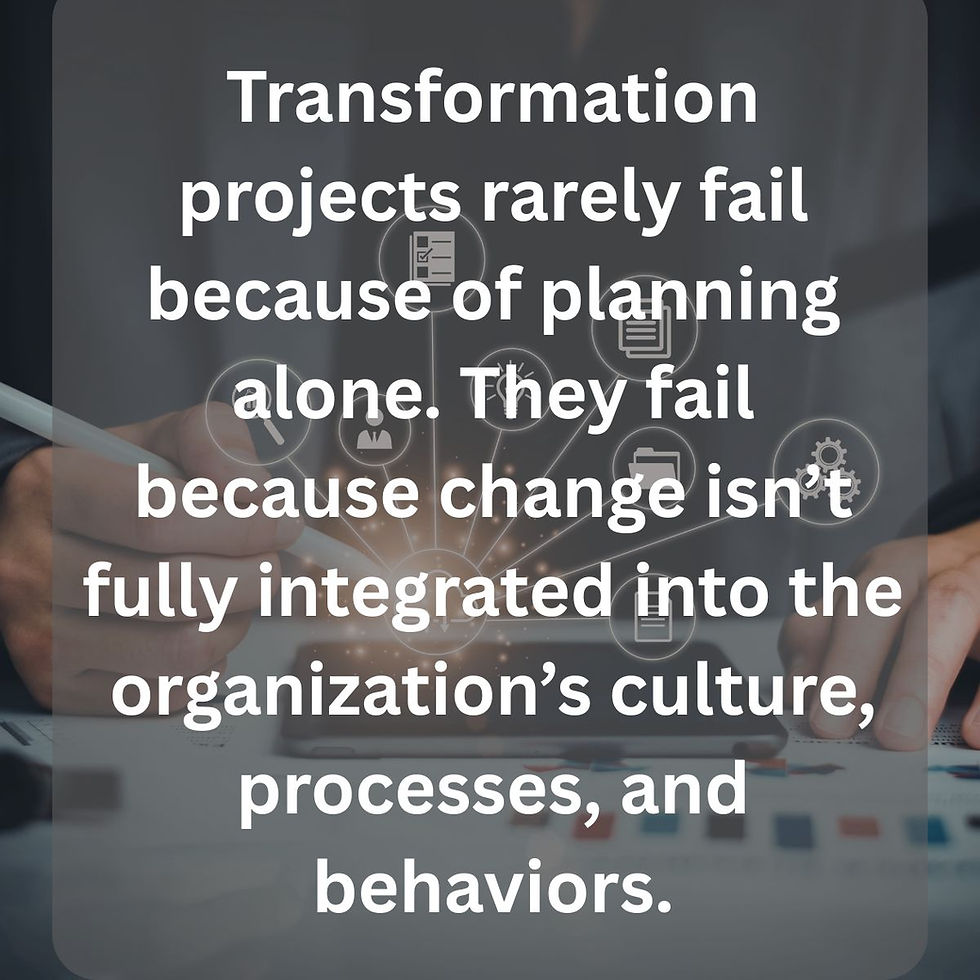Unlocking Manufacturing Excellence: From Hidden Factories to Sustainable Success
- Jan 30, 2024
- 3 min read

In the world of manufacturing, two critical aspects are converging to shape the future of industry – (1) addressing the hidden factories within our operations and (2) embracing sustainability as a strategic imperative.
Hidden Factory refers to any work or processes that are not formally recognized as part of a company's official business. These processes may be inefficient, ineffective, or unnecessary, and they can consume resources and contribute to waste within the organization.
Hidden factories can take many forms, including unnecessary paperwork, unnecessary meetings, inefficient processes, or rework due to poor quality:
According to the late quality guru Armand V. Feigenbaum, who popularized the concept in 1970, the hidden factory accounts for anywhere from 20% to 40% of an organization's total capacity, and 30% of activity in a factory is unplanned.
In addition, the American Productivity & Quality Center (APQC) states that the cost of scrap and rework alone totals up to 2.2% of sales for organizations today.
Fortunately, digital transformation initiatives can help minimize the hidden factory and improve your overall operational performance. Here are some actions that companies take to reduce Hidden Factory:
Reduce Paper-Based Processes: Digitizing physical documents eliminates manual data entry processes, reduces the risk of human error, increases visibility into operations, and helps streamline workflow processes. Automating paperwork also allows for better collaboration between departments, reducing communication issues that could lead to misunderstandings or delays in production.
Improve Data Quality Control: Using digital technology allows you to collect more accurate data about your operations more quickly than ever before. This gives you better insights into how your operations run so you can make more informed decisions. It also provides greater visibility into areas where improvements can be made to ensure optimal performance in terms of cost efficiency and quality control measures — both of which are essential for minimizing the hidden factory.
Optimize Maintenance Schedules: Predictive maintenance lets you monitor equipment closely and detect anomalies that may indicate a need for maintenance or repair before they become major problems that disrupt production schedules or result in costly repairs down the road.
Sustainability as a Strategic Imperative
In parallel with addressing hidden factories, sustainability is becoming increasingly crucial in manufacturing. According to Rockwell Automation's 8th Annual State of Manufacturing Report, companies with higher revenues are more likely to have formalized ESG (Environmental, Social, and Governance) or sustainability programs (86%) compared to their counterparts in the medium revenue (80%) or low revenue (68%) brackets. The statistics are clear: sustainability is not just a buzzword; it's a strategic imperative for businesses, and it is a Consumer-Driven Sustainability Revolution.
• 86% of consumers surveyed are more likely to purchase a product from a brand or retailer if the packaging is considered sustainable (Source: Shorr).
• 77% of consumers surveyed expect more brands/retailers to offer 100% sustainable packaging for their products in the near future (Source: Shorr).
Considering the sustainability imperative, manufacturing strategies are evolving:
Stage 1 - Traditional Manufacturing: Focus primarily on the pre-manufacturing, manufacturing, and use stages of product lifecycles driven by sales forecasts, often leading to excessive waste and landfill.
Stage 2 - Lean Manufacturing: Focuses on waste elimination through the 1R principle (Reduce).
Stage 3 - Green Manufacturing: Focuses on environmental health through the use of the 3Rs (Reduce, Reuse, and Recycle).
Stage 4 - Sustainable Manufacturing: Expands upon green manufacturing to encompass the whole system, involving economic, social, and environmental benefits, incorporating the 6Rs (Reduce, Reuse, Recycle, Recover, Redesign, and Remanufacture).
In which stage is your company?
A Path to Excellence
The message is clear: sustainability is not just a trend; it's a transformational journey that not only benefits the environment but also your business's bottom line and reputation.
Embrace sustainability in addition to continuous improvement programs (such as lean), and you'll not only reduce your hidden factory but also position your organization for a brighter, more responsible future. This combination of addressing hidden factories and embracing sustainability is the path to manufacturing excellence in the modern world.
Take the first step towards this transformative journey and assess your current stage.
Book a free assessment session with our expert team today.
Nancy Nouaimeh
Culture Transformation and Organizational Excellence Expert




Comments